Niger - Land of Eden - an interview with Ishtar
Peopleized by: Szavanna - Monday, 25 June 2007
 Szavanna: Hi Ishtar - thanks for agreeing to answer my questions. My first question of course is - how did you end up in Niger in 1986? What connections did your parents have with Africa?
Szavanna: Hi Ishtar - thanks for agreeing to answer my questions. My first question of course is - how did you end up in Niger in 1986? What connections did your parents have with Africa?Ishtar: My Dad first crossed the Sahara desert the mid 1970s, when the first seed of Eden was born. There’s an article on Eden’s website entitled The Lost Treasures of Eden, which talks about how he came across a plant growing in the middle of nowhere. He was struck by its potential and wondered what the consequences would be if such a plant could give human food.
My parents chose Niger because out all the countries in West Africa, it was the country most threatened by desertification, and yet was at the time receiving the least international aid. So that’s the reason why we packed all our belongings and drove south from Tunisia to Niger, a journey that took a little more than five weeks.
 Szavanna: You write that you stay 6 months in Sweden and 6 months in Niger - what do you do in those half-year periods?
Szavanna: You write that you stay 6 months in Sweden and 6 months in Niger - what do you do in those half-year periods?Ishtar: Well, when I’m in Africa, I work with PR, writing Eden newsletters and articles, working with correspondence and training the Eden field team in what kind of information our sponsors (most of the private people) are interested in hearing. We have a very rich material with 7000 pictures and lots of social documentation, so to me, it’s a dream job because there is always something to say.
 The only catch with working as a volunteer in Niger is that I don’t get paid, so when I’m in Sweden, I mostly work (for money, currently I have two jobs), hold Eden presentations and catch up with friends and family.
The only catch with working as a volunteer in Niger is that I don’t get paid, so when I’m in Sweden, I mostly work (for money, currently I have two jobs), hold Eden presentations and catch up with friends and family.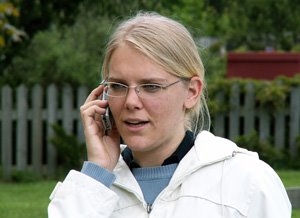 Szavanna: Describe a day in Niger - what do you do from the moment you wake up till you go to sleep?
Szavanna: Describe a day in Niger - what do you do from the moment you wake up till you go to sleep?Ishtar: Wow, what nostalgia you awake! Normally I start the day with work, but it’s my intension to start every morning with a quick ride, even if it means going up at six o’clock. Just have to get to bed later, meaning I can’t sit up and blog, hehe! Anyway, work hours in Niger are between 07.30-12.30 followed by a long siesta, only to pick it up again in the afternoon from 3.30-6.30 pm. When I was studying, I used bring out my books in the sun after lunch and wrap up in time to have a ride in the afternoons. Since discovering the solar oven, I normally fix the next day’s lunch in the evening instead of in the middle of the day, and this saves a lot of time as food is ready when you come home and you just have to take it out of the solar oven.
 So somewhere after supper, I normally go into the kitchen and put together what seems to be a good mix. I really enjoy cooking and the solar oven has been an intriguing challenge as you have to rethink, as slow cooked food needs to be positioned in a certain way, and you also have to think about differences in texture and moisture. The best thing about solar cooked food however is neither that it’s time consuming or cheap, but the amazing richness is taste that you get!
So somewhere after supper, I normally go into the kitchen and put together what seems to be a good mix. I really enjoy cooking and the solar oven has been an intriguing challenge as you have to rethink, as slow cooked food needs to be positioned in a certain way, and you also have to think about differences in texture and moisture. The best thing about solar cooked food however is neither that it’s time consuming or cheap, but the amazing richness is taste that you get!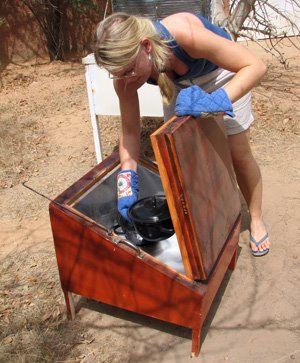 As for the rest of the household chores, there is often a lot of people coming and going while you’re at home. There’s the greengrocer man who sells fruit and vegetables, the meat man who (obviously) sells meat, the egg man from Kania and so on …
As for the rest of the household chores, there is often a lot of people coming and going while you’re at home. There’s the greengrocer man who sells fruit and vegetables, the meat man who (obviously) sells meat, the egg man from Kania and so on …
 People are really into coming home to you in Niger, which is cool since you don’t have to rush around town trying to get hold of people, but it can also get a bit too busy, going from one person to another. There’s a man for just about everything, but the greatest luxury is having your personal tailor come with clothes you get to try at home, and if there is something that doesn’t fit, he fixes it! At least as long as it’s still fixable, that is…
People are really into coming home to you in Niger, which is cool since you don’t have to rush around town trying to get hold of people, but it can also get a bit too busy, going from one person to another. There’s a man for just about everything, but the greatest luxury is having your personal tailor come with clothes you get to try at home, and if there is something that doesn’t fit, he fixes it! At least as long as it’s still fixable, that is…So as you can see, my days are pretty much filled up with work, horses, household stuff and seeing people, an “obligatory” half-an-hour in the sun (I seem to need it as much as coffee and my daily timeout with the horses) and then finally keeping in touch with people in Europe. That’s why I started the blog in the first place, so that I could post all the pictures in the same place and not have to send them around all the time. I was into writing personal newsletters (still do, although not very frequently), but by the time I got them out, all my close friends had already heard the details, so they didn’t find them very interesting anymore…
Szavanna: Please introduce us to the Eden Foundation.
Ishtar: Ah… Eden Foundation is next to Niger the love of my life! Eden is, simply put, quite unique. It’s visionary, it’s down-to-basic kind of aid that makes a genuine contribution. It’s not the place to go if you’re a mainstream kind of person, because you wouldn’t like the time tables we use. If the development work you do is going to be sustainable in the end, it has to start from the inside, and Eden has a lot of patience. We believe in a simple solution, but we let things take their time. And the success has been huge. I came into Eden at a time when there were things to show for all the hard work, but my parents started off with just a vision. My role is easy: I look at the changes that are taking place within our Tanout society and I translate it to Western people so that they can see it for what it really is. I love telling people about Eden. I love holding presentations and telling people about the awakening that has taken place amidst the least developed area in the least developed country in the world. I show pictures of genuine happiness, of proud mothers and their healthy children, of fathers who have understood the value of trees and who have gone against local customs and stopped cutting down their perennials in order to get rid of crop-eating birds. When I present our Eden families to the rich in Europe, they marvel. I still remember the top bankers at a Swedish Rottary club who tanked me for coming to them, saying “We just can’t believe how those people can be so happy.” For them, it was an impossibility. Poor people with nothing but fruits – how could they be so happy? You see, Westerners have all the material but not the happiness. My dad is right when he writes: “It is difficult to understand, but just as the rich never found the right food, they never seem to find the right values either. The worst thing we can do is to be contemptuous toward the poor and their lifestyle. Electricity will not solve their problems, neither will cars. The infrastructure that would open Africa for export and import will not solve their problems and it may never even become a reality. By enabling people to produce their own food, so retaining their intrinsic dignity, they are being given a chance not by being told what to do, but by being given multiple options in life.” He wrote that more than twenty years ago and I still marvel, because there’s continuity about Eden and I like that.
Szavanna: How would you describe Niger to someone who has never been there ( I know it's not easy to give a short description )
Ishtar: Niger is the country that stands still, for better or for worse. It’s a country where things take ages to come about and where stressful people go berserk. But that’s just the thing really. The first two weeks in Niger, when coming from any progressing areas, are disastrous, unless you’ve come for a vacation. However, after those first two transitional weeks, something within in you will change, and the real culture chock actually arrives when you come back to your home country, wondering why everybody is doing what they are without ever asking themselves why…
 Szavanna: How did Niger and travelling in general changed how you look at life?
Szavanna: How did Niger and travelling in general changed how you look at life?Ishtar: Ah… Niger is my little “life secret”. It’s a special pulse that I carry within me wherever I go. On the outside, I make a perfect Swede, but not a day that goes by when I’m away from Niger that I don’t think about it, when I don’t count the days until I go back. Traveling in general has made me a lot more humble towards other societies, but since I have been traveling since the age of 1, I don’t really know what I was like before I started traveling… :-) It’s just a natural part of my life, living in a world where we may all be very strong individuals, but where we still have to share with all our neighbors. Regardless of how much we have or don’t have in common!

| shtar's Page | Authors Page: Szavanna |
powered by Peopleized!
Thanks the interview, Szavanna! Loved the questions (as you can see)!
And the photo collage was great!
Ishtar









































.jpg)

.jpg)














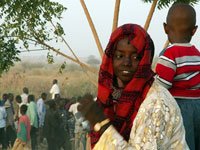







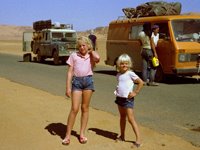



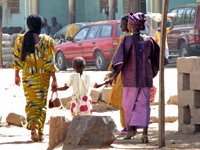
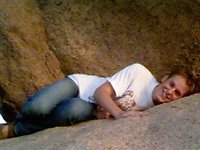

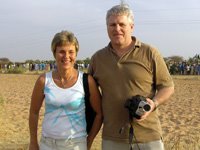
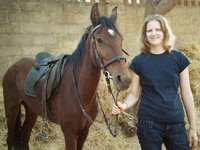
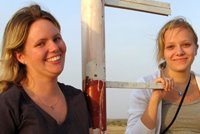
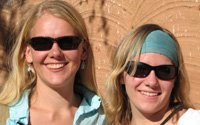




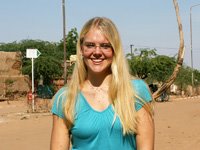
13 comments:
Guys, the good work you're doing is giving people better dreams to achieve. In turn, those people will go on to influence others and a strong ripple will just carry on. Keep it going. Much love from Izz and his family.
Thanks Izz, that was very sweet!
Ishtar
Wowo, that was a very comprehensive 'learning' more about you. You really are a priceless jewel to the people of Niger. If i may ask you a personal question. Can you marry someone from Niger or an African? :)
Ugo: I wouldn't care what origin he had, as long as we had the same intentions in life and complemented one other. Does that answer your question? :-)
Ishtar, very good answer.
Brilliant interview. Thanks for the testimony. I'll call it "exodus part II"
I enjoyed reading the interview, and your website is quite interesting. I really didn't know much about Niger until now--I only knew it's location on the map.
Just read your interview with Szavanna.... It felt so good inside reading it. The organization you described, the way you sounded, makes me feel that my cynicism about development might not be all that justified. I am always for seeing a community, a people, help themselves, with the resources available to them.... Actually, that is what drove me from Development to Anthropology... at least one can understand a certain issue or community to the point of being able to recommend a meaningful intervention.
Bravo Ishtar!! I am immensely priviledged to know you and hugely proud of what you do! You are an inspiration to others....
Childwoman
Sounds like you dad is a wise man. You are fortunate, indeed!
hey Ishtar!! I saw Szavanna's blog...I am a rocking girl!!! I did a happy dance...thanks so much for nominating me....I am honoured.....Hugs! :D
Hi there again - I see I didn't even leave a comment here (hm - how did that happen...hm ) ok so what I wanted to say/write is : I am just so lucky to have come accross Ishtar in this vast Afrosphere - initially I had to keep checking if your blog is still there - (and it is ...:-) so much to see & learn from your posts.
I am happy your blog is getting more and more famous - if it carries on like this - it will soon replace CNN - which is exactly the idea :)
Loomnnie: I understand your cynicism because I have seen close-handed what the top aid organizations are actually doing in the world (or should I say not doing) and even if they wouldn't fall on politics, financial benefits (one's own, that is) or lack of respect for local culture and dignity, they certainly fail in the area of sustainability. People often go out of their way to find a solution that is high tech and fits with the Western World - forgetting that other cultures have other values. What I love about Eden is the simplicity of it all, and the time frame. We're not talking years; we're talking generations.
Post a Comment